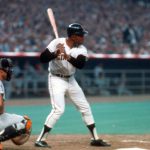
Willie Mays, who passed away Tuesday at 93, is among the greatest baseball players ever. Few other ballplayers matched the talent of Mays, who ranks sixth all-time with 660 home runs and won 12 Gold Glove Awards. As a prestigious hitter, Mays surpassed 50 home runs in 10 years, in 1955 and 1965, and batted .301 lifetime. He earned the famous nickname “Say Hey Kid” in his rookie season with the New York Giants in 1951, thanks to sportswriter Barney Kremenko.
However, his signature moment will forever be the over-the-shoulder catch he made in the 1954 World Series opener. In honor of his 23-year Hall of Fame career, five moments define who he was as a player and to the game of baseball. His legacy will never be forgotten.
Amazing Willie Mays Moments
Mays Hits Four Home Runs in a Game
On April 30, 1961, Mays went 4-for-5 with four home runs and eight RBI in a 14-4 win against the Milwaukee Braves. His four-homer effort came opposite of another legend, Henry Aaron, who hit two home runs of his own. Mays hit his first two long balls in third, off Lew Burdette. He kept on rolling with a three-run home run off reliever Seth Morehead before adding a two-run shot off Don McMahon in the eighth. Mays became one of 18 players in major league history to hit four home runs in a game. He is the only member of the 600-home run club to do so.
Home Run No. 500
Only four other players- Babe Ruth, Jimmie Foxx, Ted Williams, and Mel Ott– reached that milestone before Mays hit his 500th. Mays was 34 when he reached the milestone on September 13, 1965. Eleven years after winning his first NL MVP, Mays won his second thanks to a career-high 52 home runs. Mays had the league’s best marks in OBP (.398), slugging (.645), and total bases (360). The 11-year gap marks the widest for any player between his first and second MVP awards.
Mays Joins 3,000 Hit Club
The 500-home run club had four members when Mays joined. The 600-home run club had only one. Nevertheless, Mays made a club of his own when he hit No. 3,000 off Montreal Expos pitcher Wegner at Candlestick Park. Mays became the first player in history with 3,000 hits and 600 home runs. Only Hank Aaron, Alex Rodriguez, and Albert Pujols have done so since. Mays was the 10th player to join the 3,000-hit club, earning the milestone more than two months after Aaron.
All-Time All-Star
1973 marked Mays finishing his career with a record 24 All-Star Game appearances. Mays made the Midsummer Classic every season over 20 years, from 1954 to 1973. Mays was an All-Star Game starter 18 times, the most for any player in MLB history. In All-Star Games, Mays had a slash line of .307/.366/.533, which is close to his career marks of .301/.384/.557. Mays was also named All-Star Game MVP in both 1963 and 1968. A feat like that is untouchable these days. Barry Bonds never did it, and Shohei Ohtani may never do it either.
Giants/Mets Retire Mays’ No. 24
The Giants retired Mays’s number in 1972. He became the second player to reach 600 home runs, exceed 100 runs scored in 12 consecutive seasons, and won the Gold Glove Award in its first 12 years of existence. Mays twice won the National League MVP and was named a starting outfielder on the All-Centry Team. Mays remains the franchise leader in games played, at-bats, runs, hits, doubles, home runs, total bases, and extra-base hits.
The New York Mets waited 50 years to follow through with a promise. Original Mets owner Joan Payson traded for Mays in 1972, promising him he would be the last Mets player to wear No. 24. Payson’s promise was largely forgotten when three other Mets players wore the number. That all changed when the Mets announced that they were retiring May’s number on August 27, 2022.
Mays played a small but impactful role in his final two seasons with the Mets. He hit his 660th and final home run with the club and delivered multiple RBI singles during the 1973 postseason. Mays hit one in Game 5 of the National League Championship Series and another in Game 2 of the World Series. The Mets won both.
Main Photo: Focus on Sport/Getty Images
The post Five Moments That Define the Legendary Career of Willie Mays appeared first on Last Word On Baseball.